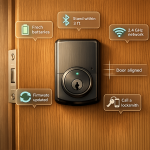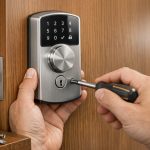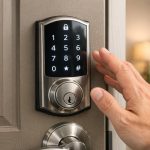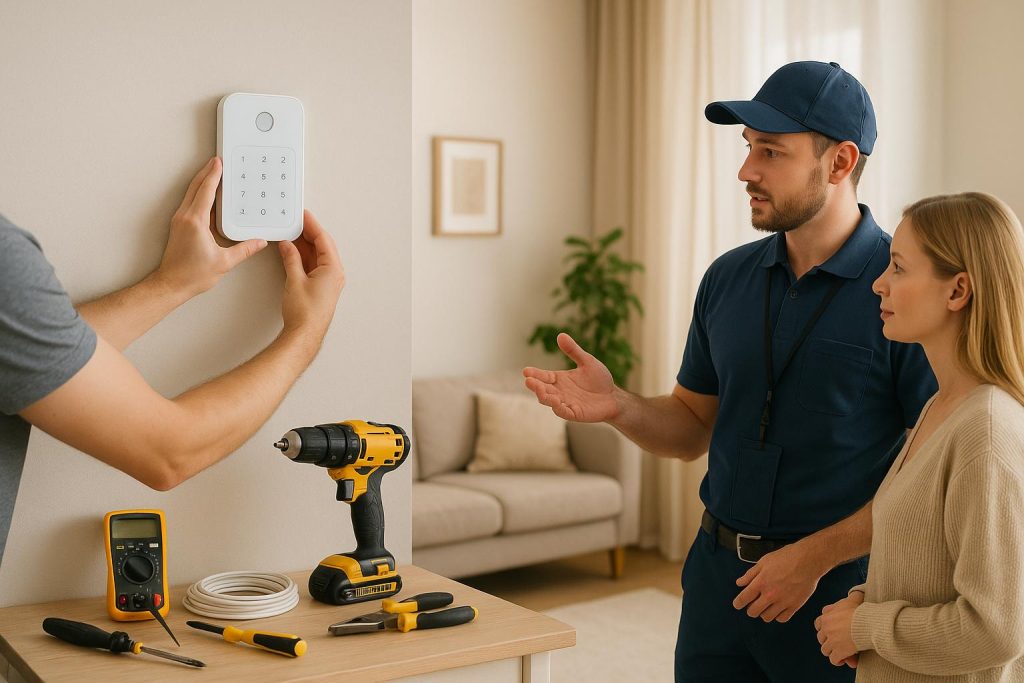When securing your home, the choice between DIY alarm installation and professional installation comes down to your budget, time, and technical skills. Here’s a quick breakdown:
- DIY Installation: Lower upfront cost, flexible scheduling, and easy expandability. However, it requires technical knowledge, careful planning, and troubleshooting if issues arise.
- Professional Installation: Higher cost but includes expert setup, reliable coverage, and 24/7 monitoring. Drawbacks include scheduling hassles, long-term contracts, and less flexibility for changes.
Key Takeaway: DIY is ideal if you’re tech-savvy and want to save money. Professional installation is better for those seeking hassle-free, expert-level security with ongoing support.
Quick Comparison:
| Factor | DIY Installation | Professional Installation |
|---|---|---|
| Cost | Lower upfront cost | Higher upfront and ongoing fees |
| Setup Time | Self-paced, may take hours | Completed in one technician visit |
| Monitoring | Self-monitoring | 24/7 professional monitoring |
| Support | Limited online resources | Dedicated technician support |
| Flexibility | Easy to modify or expand | Requires service appointments |
| Insurance Benefits | Minimal or none | Potential discounts |
Choose based on your home’s needs, budget, and how much effort you’re willing to invest.
BEST Home Security: Monitored Alarm Systems Vs. DIY Alarm Systems
DIY Alarm Installation
DIY alarm installation involves purchasing a kit that typically includes sensors, control panels, cameras, and a mobile app for self-monitoring. The time it takes to set up depends on your home’s size and the system’s complexity. Here’s a closer look at the upsides and challenges of this approach.
Setting up involves mounting sensors on doors and windows, placing motion detectors strategically, installing a control panel, and configuring the system using the accompanying app. Many kits use adhesive strips or other simple mounting methods, making the process easier and eliminating the need for complex wiring.
Benefits of DIY Alarm Installation
One of the biggest perks of DIY installation is the cost savings. By skipping professional installation fees, your primary expense is the equipment itself, which can make this option more budget-friendly.
Another advantage is the flexibility to install on your own schedule. You don’t need to coordinate with technicians or wait for appointments. This freedom allows you to work at your own pace and make adjustments as needed.
Doing the installation yourself also gives you a better understanding of how the system operates. This knowledge can be incredibly helpful if you ever need to troubleshoot issues or expand the system in the future. It also makes it easier to explain the system’s functionality to other household members.
Many DIY systems are contract-free, giving you the option to self-monitor or subscribe to professional monitoring services without long-term commitments. This flexibility lets you tailor the service to your specific needs.
Lastly, the modular design of most DIY systems makes them easy to upgrade. Once you’re familiar with your system, adding components like extra sensors, cameras, or smart home integrations is usually straightforward and doesn’t require professional help.
Problems with DIY Alarm Installation
Despite its benefits, DIY installation comes with potential drawbacks. Improper sensor placement can leave security gaps, and poorly mounted sensors may malfunction or cause false alarms.
Limited technical support can also pose challenges. While many companies provide phone or online assistance, in-person help is rarely available. This can make troubleshooting connectivity issues or malfunctioning sensors more difficult.
Wireless interference is another concern. Homes with numerous smart devices or unique construction features might experience connectivity issues, especially if sensors are located far from the central hub.
Complex home layouts can further complicate installation. Multi-level homes or those with irregular designs require careful planning to ensure all areas are covered. What may seem like a simple project can quickly become time-consuming if unexpected issues arise.
Understanding these pros and cons can help you determine whether a DIY alarm system is the right choice for your home or if professional installation might be a better fit.
Professional Alarm Installation
Opting for professional alarm installation means bringing in certified experts to set up a tailored security system for your home. These technicians start with a detailed security evaluation, analyzing your home’s layout to pinpoint vulnerable spots and determine the best locations for sensors and cameras.
From there, they handle everything – wiring, mounting, programming, and testing – ensuring the system integrates seamlessly with any existing setups. They also include advanced features like hardwired connections and backup power for added reliability. The installation process usually takes anywhere from 4 to 8 hours, and technicians provide hands-on training to make sure you’re comfortable operating the system.
Benefits of Professional Installation
Professional installation offers several clear advantages over DIY options.
- Expert evaluation and design: Certified technicians conduct thorough assessments, identifying blind spots and vulnerabilities that might go unnoticed by an untrained eye. They customize the system to fit your home’s layout, ensuring full coverage without gaps.
- Top-tier equipment: Professional systems often include higher-quality components, such as sensors with broader range, more reliable communication, and advanced features like glass-break detection and monitoring for smoke, carbon monoxide, and flooding.
- Flawless setup and testing: Technicians ensure that sensors are securely mounted and optimally positioned. They also test every component to confirm that the system communicates effectively with monitoring centers.
- 24/7 monitoring: With professional monitoring, trained operators respond immediately when an alarm is triggered. This can be life-saving during emergencies like break-ins, fires, or medical crises when you’re unable to call for help.
- Insurance savings: Many homeowners insurance policies offer discounts – ranging from 5% to 20% – for professionally installed and monitored security systems. Some insurers even require professional installation to qualify for these savings.
- Ongoing support and maintenance: Professional companies typically offer regular updates, battery replacements, and troubleshooting. If something goes wrong, technicians can quickly diagnose and fix the issue.
- Smart home integration: Professional systems can connect to other smart devices, such as thermostats, lighting, and door locks, creating a unified home automation platform.
Problems with Professional Installation
Despite the benefits, professional installation does come with some downsides.
- Higher upfront costs: Installation fees range from $500 to $1,500, plus the cost of equipment. Systems with premium features can drive these costs even higher.
- Monthly monitoring fees: Professional monitoring typically costs $20 to $60 per month, adding up to $240 to $720 annually. These fees continue as long as you maintain the service.
- Contract commitments: Many companies require 2 to 5-year contracts, with early termination fees of $200 to $500. This can be a drawback if you want to switch providers or cancel service.
- Scheduling hassles: Installation and maintenance require coordinating with technicians, which might mean waiting 1 to 3 weeks for an appointment. You’ll also need to be home during the scheduled time, which can be inconvenient.
- Limited post-installation flexibility: Making changes to your system often requires a service call, which comes with additional fees. Adding new sensors or reconfiguring the system isn’t typically something you can do on your own.
- Dependence on the provider: If the company changes its terms, goes out of business, or stops offering support, you could face challenges maintaining or updating your system.
While professional installation offers peace of mind and advanced features, it’s essential to weigh these benefits against the added costs and potential limitations.
DIY vs Professional Installation Comparison
When deciding between DIY and professional installations, it’s important to weigh factors like cost, setup time, and the overall effectiveness of your security system.
Cost is a significant difference. DIY systems generally have lower upfront costs since you’re only paying for the equipment. Meanwhile, professional installations come with service fees, but those fees often include added benefits like expert setup and ongoing support.
Setup time is another consideration. A DIY installation can take several hours, depending on the complexity of the system and your familiarity with the process. On the other hand, professional installations are typically completed in a single scheduled visit by trained technicians.
There’s also the learning curve to think about. With a DIY system, you’ll need to figure out sensor placement, wireless setup, and troubleshooting on your own. Professional installers take care of these technical details and often provide guidance on how to use your system effectively.
Here’s a quick breakdown of the key differences:
| Factor | DIY Installation | Professional Installation |
|---|---|---|
| Cost | Lower initial equipment costs | Higher due to service fees |
| Setup Time | Several hours, depending on complexity | Completed in one technician visit |
| Security Coverage | Basic coverage, with possible gaps | Comprehensive, based on expert assessment |
| Monitoring Options | Self-monitoring required | Includes 24/7 professional monitoring |
| Support | Limited to online resources and forums | Access to dedicated technician support |
| Flexibility | Easy to modify or expand at your own pace | Changes may need technician scheduling |
| Insurance Benefits | Minimal impact on premiums | May qualify for homeowners insurance discounts |
Another key distinction lies in monitoring and emergency response. DIY systems often rely on self-monitoring, meaning it’s up to you to respond to alerts. Professional systems, however, typically include round-the-clock monitoring, ensuring faster emergency responses when needed.
Finally, consider the long-term benefits. DIY systems are more flexible, allowing you to add or modify components as needed. Professional systems, though, often come with warranties, dedicated support, and potential savings on homeowners insurance.
Ultimately, the choice boils down to your priorities. If you value affordability and flexibility, DIY might be the way to go. But if you’re looking for a hassle-free setup with comprehensive support and monitoring, professional installation could be worth the investment.
sbb-itb-643e28e
How to Choose Between DIY and Professional Installation
Deciding between DIY and professional alarm installation comes down to evaluating your property’s needs, your budget, and how much time and technical know-how you can commit to the process.
Property Size and Layout
If you live in a smaller home with a straightforward layout, a DIY installation can often get the job done. However, larger or more intricate properties can be tricky. Ensuring complete security coverage in these cases might require a professional’s touch. Experts can assess the best spots for sensors and address challenges like connectivity issues or blind spots caused by your home’s structure. Plus, they can help you weigh how layout complexities might influence overall costs.
Budget and Ongoing Costs
Your budget isn’t just about the upfront price of the equipment – it also includes maintenance and potential long-term expenses. DIY systems usually cost less initially, but mistakes during installation could lead to extra costs down the line. On the other hand, professional installations come with higher upfront expenses but often include warranties and ongoing support. These perks can help you avoid surprise repair bills. Additionally, professionally installed systems sometimes qualify for homeowners’ insurance discounts and often come with continuous monitoring and 24/7 emergency response services.
Technical Skills and Available Time
Your level of technical skill and the time you can dedicate are just as important as your budget. Setting up a DIY alarm system means following detailed instructions, troubleshooting issues, and handling routine tasks like updating software or replacing batteries. If you’re not confident in your technical abilities or have a packed schedule, professional installation might be the better option. It ensures the system is set up correctly and optimized without requiring you to spend hours figuring it out.
With modern systems often including smart integrations, professional installation can also save you the hassle of navigating a steep learning curve while giving you peace of mind that everything is running smoothly.
Professional Alarm Services in Pittsburgh, PA
When it comes to securing your home or business, local expertise can make all the difference. In Pittsburgh, Sherlock’s Locksmith stands out as a trusted provider of professional alarm system installations for both residential and commercial clients.
One of the key advantages they offer is their 24/7 mobile service, ensuring that installations and maintenance are handled promptly and efficiently, no matter the time. Their certified technicians are equipped with advanced tools to install a wide range of security solutions, including alarm systems, keyless entry setups, biometric locks, and access control systems. This approach ensures a seamless and comprehensive upgrade to your security.
What sets a local provider like Sherlock’s Locksmith apart is their ability to deliver direct and timely support, avoiding the frustrating delays often associated with larger, less personalized services. Their mobile service model brings the expertise and equipment directly to your location, ensuring the job is done right the first time.
For Pittsburgh residents and businesses looking for a dependable and efficient security solution, Sherlock’s Locksmith offers a professional service that combines local knowledge with cutting-edge tools to meet your needs.
Conclusion
Installing a security system yourself can save money upfront and give you the flexibility to work on your own schedule. However, it comes with potential downsides like installation errors and limited support. On the other hand, professional installation may cost more, but it ensures a system that’s expertly set up for reliable, long-term performance.
Professional installers know how to position devices for maximum coverage, reducing blind spots and minimizing the chance of mistakes or malfunctions. This level of expertise can make a big difference, especially if you’re looking for a system that provides consistent and dependable protection.
If you’re in Pittsburgh and want a security system that goes beyond basic functionality, professional services – like those offered by Sherlock’s Locksmith – can provide the peace of mind you need. The combination of advanced technology, tailored solutions, and ongoing support makes professional installation a worthwhile investment for those serious about home security. Ultimately, the right choice depends on your property’s needs and your long-term security priorities.
FAQs
What should I think about when choosing between installing a home alarm system myself or hiring a professional?
When choosing between DIY alarm installation and hiring a professional, it’s important to weigh factors like your home’s design, your comfort with technology, and your budget.
DIY systems tend to be more budget-friendly and offer flexibility, making them a great choice for smaller homes or simpler setups. But there’s a catch: if the system isn’t installed correctly, you could face problems like false alarms or weak spots in your security.
On the other hand, professional installation guarantees that your system is installed properly, providing dependable protection – especially for larger homes or those with complex layouts and multiple access points. While this option usually involves higher upfront costs and scheduling an appointment, the expertise and peace of mind it provides can make it a worthwhile investment for many homeowners.
Are there unexpected costs with DIY alarm system installation?
When setting up a DIY alarm system, there are a few hidden costs you might not expect. One of the most common is false alarm fees. If the system isn’t installed correctly, it could trigger unnecessary emergency responses, which might result in fines.
Another factor to keep in mind is home insurance discounts. Some insurance companies offer lower premiums for professionally installed systems but may not extend the same benefits to those you install yourself. This could mean missing out on potential savings.
Lastly, there’s the price of errors. An improperly installed system could leave vulnerabilities in your home’s security. Fixing these issues or upgrading the system later can end up being costly. While DIY systems can save money upfront, these unexpected expenses might offset the initial savings.
Can installing a professionally installed alarm system help lower my homeowners insurance premiums?
Yes, getting a professionally installed alarm system can help you save on your homeowners insurance premiums. Many insurance companies provide discounts – often ranging from 15–20% – because these systems lower the chances of theft or property damage. Insurers tend to view professionally installed systems as more dependable, which boosts their confidence in your home’s security.
So, if you’re thinking about upgrading your home’s security, a professional installation doesn’t just improve safety – it could also cut down on your insurance costs over time.









